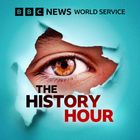
The History Hour
May 17, 2024
Max Pearson presents a collection of this week’s Witness History episodes from the BBC World Service.
This week, we hear how nuclear testing changed politics in French Polynesia.
Plus, the story of how the FBI caught Ana Montes, the spy known as the ‘Queen of Cuba’.
We also talk to Jewish and Palestinian people about the moment the state of Israel was proclaimed in 1948.
Finally, we tell the unlikely story of how a heavy metal rock band emerged during the violent years of Saddam Hussein's regime in Iraq.
Contributors: Antony Géros - President of the Assembly of French Polynesia KDee Aimiti Ma'ia'i – doctoral candidate at University of Oxford Pete Lapp – former FBI agent Hasan Hammami Arieh Handler Zipporah Porath Firas Al-Lateef – bass player
(Photo: Antony Géros. Credit: Getty Images)

